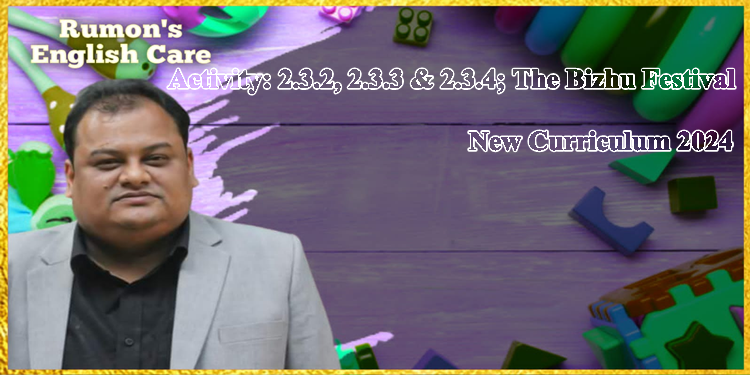Activity: 2.3.2, 2.3.3 & 2.3.4; The Bizhu Festival
2.3.2 Now, let’s have a look at the changes in the verb of reported speech in the indirect speech according to different tenses.
| Reporting Verb | The tense of the verb in direct speech | The tense of the verb in indirect speech | Example of Direct speech | Example of Indirect speech |
| Present/ Future Tense | No Change | No change | Jamal say, “I like to watch cooking shows whenever I am free.” | Jamal says that he likes to watch cooking shows whenever he is free. |
| Past Indefinite Tense | Present Indefinite | Past Indefinite | Jamal said, “I like to watch cooking shows whenever I am free.” | Jamal said that he liked to watch cooking shows whenever he was free. |
| Past Indefinite Tense | Present Continuous | Past Continuous | The head teacher said, “The students are helping the decorating the auditorium.” | The teacher said that the students were helping the teachers in decorating the auditorium. |
| Past Indefinite | Present Perfect | Past Perfect | Eti said, “I have helped my teachers decorate the auditorium.” | Eti said that she had helped her teachers decorate the auditorium. |
| Past Indefinite Tense | Present Perfect Continuous | Past Perfect Continuous | Eti said, “I have been helping my teachers in decorating the auditorium for an hour.” | Eti said that she had been helping her teachers in decorating the auditorium for an hour. |
| Past Indefinite | Past Indefinite | Past Perfect | Nahar said, “I worked with my friends to write an interview questionnaire.” | Nahar said that she had worked with her friends to write an interview questionnaire. |
| Past Indefinite | Past Continuous | Past Perfect Continuous | Nasir said, “I was working with my friends to write an interview questionnaire.” | Nasir said that he had been working with his friends to write an interview questionnaire. |
| Past Indefinite Tense | Verbs like shall/ will/ may/ can etc | Past forms of verbs like should/ would/ might/ could etc | Rini said, “I will apply to join the cricket team.” | Rini said that she would apply to join the cricket team. |
2.3.3 Read the text in 2.2.2 again and write how you will retell the messages to your parents using your own words. You can start writing your text in the following way-
Answer:
Today entering class, our English teacher, Rubel sir asked us with a surprise what had happened to us all. He also asked us if there was anything that he had missed. We replied with a satisfying smile that the education minister had visited our school the previous day and that incident had made us very excited. The teacher asked us if the minister had gone to our class. We replied in the affirmative and said that she (m) had visited our class and spent some time with us. She had also asked us some questions to which we had replied properly. Hearing this, the teacher became very happy and thanked us for our effort. Then we moved on to our next lesson. The teacher proposed that we should work with the new activities. But we wanted to continue talking about our experience with the minister. So, one of us asked him if we might carry on talking about many interesting things that had happened the previous day. We also said that we would like to share those with him. The teacher replied with assurance that he would love to hear that.
2.3.4 Now, read the following note on summary. Then write a summary of the text that you have written in activity 2.3.3. Finally, share your summary in pairs/groups.
Answer:
I have read the note on summary and followed the following steps for writing the summary:
(i) Read to identify the main ideas and distinguish them from the details: I have read the text thoroughly to understand its main ideas and distinguish them from the details.
(ii) Written the main ideas in a list: I have identified and written the main ideas presented in the text, such as the English teacher’s query in class, informing the teacher of the Education Minister’s visit ,appreciation of the student’s effort by the teacher, one students request to carry on the discussion on the Minister’s visit, and students sharing their interesting experience with the teacher.
(iii) Begun the summary with an introductory statement: Today, in reply to the English teacher’s query in class, the students satisfactorily informed him that the previous day the Education Minister had visited their school and class.
(iv) Turned the main ideas into sentences logically: I have presented the main ideas into sentences in a logical order to form a coherent summary. I have also occasionally included details when it has been necessary to convey the main idea.
(v) Condensed Information: I have combined the sentence into one paragraph by removing unnecessary details and focusing on the essential points.
(vi) Used transition words: I have used transition words like “Today”, “That”, “and”, “Instead of” for smooth transitions between ideas.
(vi) Reviewed for clarity: I have proofread the summary to find out errors in punctuation, spelling, sentence structure, and content. I have fixed (edited) them.
Summary: Today in reply to the English teacher’s query in class, the students satisfactorily informed him that the previous day the Education Minister had visited their school and class. She asked them questions, got proper answers, and spent some time with them. The teacher appreciated their efforts. Instead of starting activities if the next lesson, he allowed them to continue talking about the Miniter’s visit and sharing their interesting experiences.

